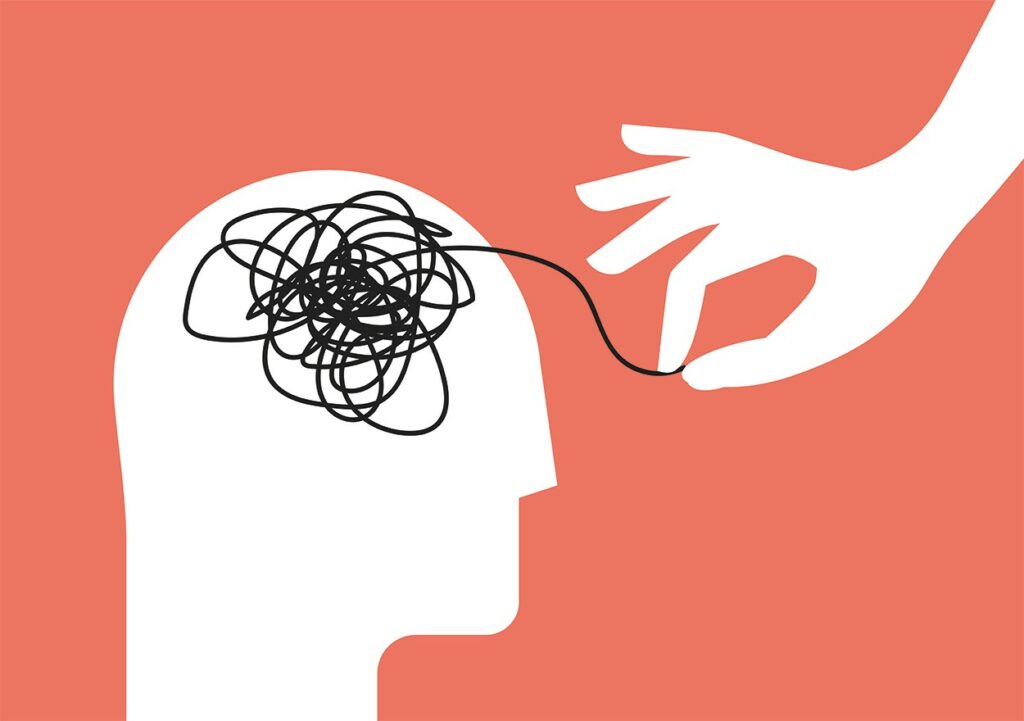If you have been diagnosed with Obsessive-Compulsive Personality Disorder (OCPD), you may be feeling overwhelmed and confused. You may be wondering where to start when it comes to getting treatment. This is why we have created this ultimate guide to CBT for OCPD. In this guide, we will discuss what CBT is, how it can help treat OCPD and the benefits of therapy. So, if you are ready to start on the road to recovery, keep reading!
Contents
What Is OCPD?
 Before we understand how CBT for OCPD is helpful, it is essential to have a clear understanding of OCPD.
Before we understand how CBT for OCPD is helpful, it is essential to have a clear understanding of OCPD.
OCPD stands for Obsessive Compulsive Personality Disorder and is a long-term mental health condition. It causes an individual to have their life organized around rigid routines, perfectionism, moral codes, etc. A person with OCPD may excessively adhere to rules, regulations, and procedures at the expense of flexibility or efficiency.
Many times, individuals with OCPD have difficulty making decisions and accepting criticism. They may also be overly critical of themselves or others for not meeting their own high standards. So, overall it is a really difficult and distressing condition that requires help and support.
Is CBT For OCPD Effective?
Recently, Cognitive Behavioral Therapy (CBT) has been found to be an effective treatment for Obsessive-Compulsive Personality Disorder (OCPD). CBT is a type of psychotherapy used to help people recognize, understand and challenge negative thought patterns that influence their behavior.
One study has shown that CBT has been successful in helping those with OCPD to reduce symptoms. Such as obsessive-compulsive behavior, perfectionism, and rigidity.
The study found that after eight weeks of cognitive behavioral therapy, 65% of participants experienced a significant improvement in symptoms. While only 15% reported no change.
So, if you are dealing with OCPD, it may be worth trying CBT. It is a non-invasive treatment that has been proven to help reduce symptoms and improve the overall quality of life. Talk to your doctor about the best type of treatment for you and whether or not CBT could work for you.
How Does CBT Help OCPD?
 CBT can help people with OCPD by teaching them to manage their obsessive personality traits and remove any limiting beliefs they may have in certain areas. It can provide them with the skills they need to challenge unhelpful thoughts and behaviors. The therapy process is based on the idea that individuals can learn to identify and change negative beliefs, thoughts, and behaviors.
CBT can help people with OCPD by teaching them to manage their obsessive personality traits and remove any limiting beliefs they may have in certain areas. It can provide them with the skills they need to challenge unhelpful thoughts and behaviors. The therapy process is based on the idea that individuals can learn to identify and change negative beliefs, thoughts, and behaviors.
A therapist will work with a person with OCPD to help them determine what triggers their obsessive thinking and compulsions. While also providing strategies they can use to challenge those thoughts or behaviors. In order to create more productive responses and replace negative thoughts with more positive ones.
For example, during the session, the therapist may ask questions such as “How do you feel when someone is not following your instructions?” or “What would be a better way of responding to the situation?”. This can help the person gain insight into their behavior and learn how to respond differently in similar situations.
The right therapist can help individuals with OCPD learn to replace their obsessive thinking and compulsive behaviors with healthier thought patterns. Ultimately, CBT can teach people how to become more emotionally balanced. And better manage the signs and symptoms of their condition.
What Are The Techniques Used In CBT For OCPD?
As personality disorders are complex, a range of techniques can be used in CBT. Some of these techniques include:
- Cognitive Restructuring: A way of identifying and challenging irrational or unhelpful thoughts that may contribute to OCPD symptoms. The person may be asked to observe their thoughts and beliefs, and then evaluate them for accuracy and usefulness.
- Exposure: This type of therapy involves gradually exposing the person to their fears or anxieties in order to help them confront and overcome them. For example, a person with OCPD may need to gradually practice tasks they find difficult due to their perfectionism, such as delegating tasks to others.
- Goal Setting: Therapists and patients can set small achievable goals that may help the person manage their OCPD symptoms. Such as gradually reducing their need for control in certain situations.
- Relaxation Techniques: Learning and practicing relaxation techniques such as mindfulness or deep breathing can help the person manage their stress and anxiety.
- Interpersonal Techniques: Learning how to communicate with others in a more effective way can help the person build successful relationships. That is not defined by perfectionism and control.
CBT is an evidence-based intervention for people with OCPD. And research suggests it can be effective in reducing symptoms and improving quality of life. With the right support and guidance, people can learn to manage their OCPD symptoms more effectively.
What Are The Benefits Of CBT Therapy?
 If you are opting for CBT for OCPD, then you may be wondering about the benefits of this therapy. Here are the most common advantages that you can expect from it:
If you are opting for CBT for OCPD, then you may be wondering about the benefits of this therapy. Here are the most common advantages that you can expect from it:
1) CBT helps you to understand the thought process behind your actions and figure out how to manage them. This can be beneficial in dealing with perfectionism, which is one of the major symptoms of OCPD.
2) It also allows you to identify and alter any negative beliefs or patterns that may be contributing to your difficulties. This can be helpful in dealing with feelings of perfectionism or rigidity, which is another common symptom of OCPD.
3) CBT encourages you to develop alternative solutions to problems. This can help you learn how to find solutions that are better suited to your own particular needs and preferences, instead of relying on a rigid set of rules and expectations.
4) It also teaches you how to recognize and control negative thought patterns, which can help reduce the likelihood of developing OCD behaviors or thoughts.
5) Finally, CBT helps you develop healthier coping strategies in order to better manage stressors in your life. This is important for overall mental health, and it can be especially helpful for people suffering from OCD or OCPD.
Overall, CBT can be an incredibly effective form of therapy for those struggling with OCD or OCPD. It helps you to identify and alter negative thought patterns, develop alternative solutions to problems, and build healthier coping strategies. If you think that this type of therapy may be beneficial for you.
Then, it is important to find a qualified therapist or counselor who specializes in CBT for OCPD. With the right guidance and support, this type of therapy can help you manage your symptoms and lead a more fulfilling life.
How Can I Improve My OCPD By Own?
If you feel like CBT for OCPD may not be enough, and there’s more you can do to address the condition on your own, there are a few steps you can take.
Inventory of thoughts
First, take inventory of the situations that trigger your OCPD symptoms and behaviors. Knowing the situations that bring out these tendencies will help you recognize them in yourself, anticipate them, and ultimately work to change your behavior. Once you’ve identified the situations, it’s important to practice mindfulness and self-awareness in order to better control your reactions to them.
Reframe negative thoughts
Be sure to practice reframing negative thoughts. Since OCPD is characterized by perfectionism and rigid adherence to rules, it’s likely that you have a tendency to think in black-and-white terms or judge yourself harshly. In fact, you may even create rules and expectations for yourself that nobody else could possibly meet. When you catch yourself thinking this way, replace the negative thoughts with more positive ones.
Accept imperfections
Finally, it’s essential to accept imperfections in yourself and your life. Perfection is impossible to achieve. So recognize that failure is part of life and learn to accept it. Be kind to yourself and recognize that you can’t be perfect. But that doesn’t make you any less valuable as a person.
Following these steps can help you to improve your OCPD on your own and gain greater control of your life. It may take time, but with consistent effort and patience, you’ll be able to make progress in managing your condition. If needed, don’t hesitate to reach out for additional support from a therapist or other mental health professional.
Conclusion
In a nutshell, CBT for OCPD is greatly been used as beneficial psychotherapy to help those who suffer from it. It can help individuals take control over their compulsions, make better decisions and increase their level of functioning. CBT has been shown to significantly reduce the severity of OCPD symptoms, and improve the quality of life.
The combination of cognitive restructuring and behavioral techniques can be more effective in helping individuals with OCPD. With proper treatment and the right kind of help, it is possible to lead healthier, more fulfilling lives.
For more information and guidance, please contact MantraCare. OCD is a mental health disorder characterized by obsessions and compulsions. If you have any queries regarding Online OCD Counseling experienced therapists at MantraCare can help: Book a trial OCD therapy session


